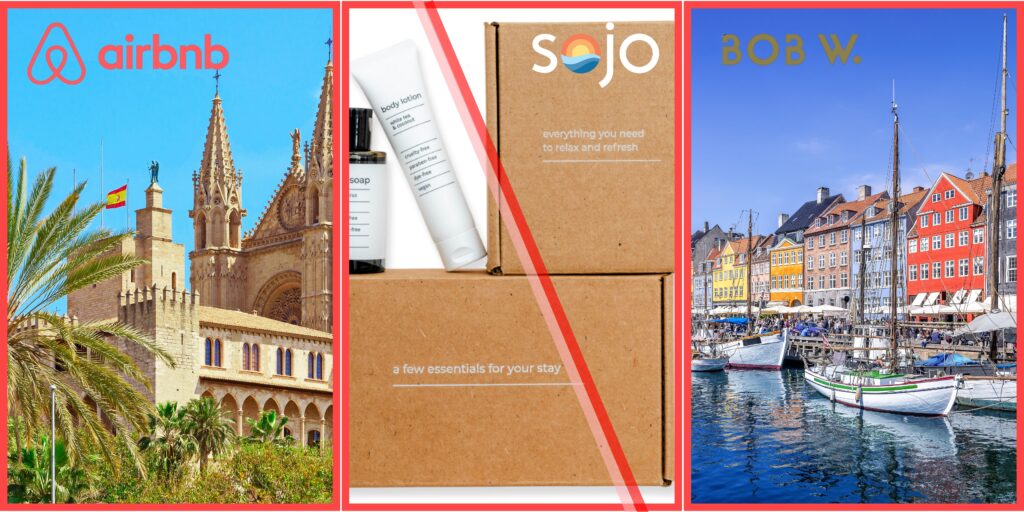Mallorca Council Partners with Airbnb to Enforce Licensing Rules
- Airbnb and the Consell de Mallorca (Mallorca Council) have signed an agreement to promote more responsible and compliant tourism on the island.
- The agreement enables local authorities to flag and expedite the removal of listings that clearly violate local regulations or Airbnb’s terms of service.
- This is part of Airbnb’s new “Listing Notification and Takedown Protocol,” designed to support the rollout of the EU’s short-term rental regulation.
- As of June 23, 2025, all new short-term rental listings in Mallorca must include a valid registration number that follows a specific format, or they cannot go live on Airbnb.
- Over 130 listings have already been removed based on violations identified by the Consell de Mallorca.
- Airbnb will also launch an educational campaign for hosts in Mallorca, focusing on new registration and licensing rules under the EU framework.
Snigdha’s Views:
- Mallorca’s partnership with Airbnb signals a clear shift: rather than resisting regulation, Airbnb is now actively collaborating with local governments to enforce it.
- This isn’t a one-off move; Airbnb has recently struck similar agreements in Ibiza and Murcia, and in Italy.
- If successful, this framework could serve as a model for other destinations in Spain and possibly across Europe. We’ve already seen Airbnb ramp up its advocacy efforts, including releasing €19 billion economic impact report to demonstrate its value and push back against restrictive regulations.
- Agreements like the one in Mallorca suggest that, at least in some regions, this strategy may be starting to shift the conversation.
- This is happening against the backdrop of recent local protests and mounting frustration over tourism pressures in Mallorca. If residents see listings being removed and rules finally enforced, it may ease tension.
- For property managers, it’s a clear sign: unregistered listings are on borrowed time.
- If more Spanish regions collaborate with Airbnb, Barcelona might also reconsider or soften the looming 2028 ban.
Sojo Launches Wander: Personalized Amenity Kits for Short-Term Rentals
- Sojo has introduced Wander, a new guest amenity solution designed for short-term rental property managers who want more than off-the-shelf kits.
- Wander allows managers to customize product mixes for each stay, personalize based on guest profiles, and add branded packaging, starting from the first shipment.
- The system syncs directly with a property manager’s reservation calendar, pulling real-time booking and guest data to assemble tailored kits. Each box arrives pre-labeled and ready to stock, saving teams time on prep.
- Managers can choose from stay-specific deliveries, usage-based refills, or bulk restocks, depending on their operational needs.
- The catalog spans bathroom essentials, kitchen staples, pantry items, and curated welcome gifts, all configurable to match the property and guest.
About Sojo:
Sojo is a U.S.-based logistics platform that helps short-term rental operators automate the stocking of in-home guest amenities. Sojo offers integrations with property management systems and provides customizable delivery models to match different operational setups, including stay-based, usage-based, and bulk shipping.
Snigdha’s Views:
- Today’s guests expect more than just a clean space. They expect a thoughtful, well-stocked experience. For professional managers, meeting that expectation across multiple properties often means dealing with fragmented sourcing, last-minute runs, and inconsistent standards.
- As industry analyst Brooke Pfautz recently noted, sourcing amenities manually is both time-consuming and costly. Wander aims to streamline this without sacrificing flexibility.
- While some managers may prefer to hand-pick amenities or work with local suppliers, those scaling portfolios or managing remote teams may find value in a plug-and-play solution that brings consistency to turn day.
- This aligns with a broader shift we’ve been tracking: tools that reduce friction behind the scenes while enhancing guest-facing value.
- Much like Breezeway’s push into linen automation or Touch Stay’s evolution into full-service guest hubs, Wander speaks to an industry maturing toward operational leverage.
- For STR managers, curated amenities may not just be a way to impress guests, they’re becoming part of the infrastructure for scale.
Bob W to Open 169-Unit Flagship Aparthotel in Copenhagen’s Meatpacking District
- Bob W has signed a long-term lease for a 7,500 sq m former police station in Copenhagen’s Meatpacking District, one of Europe’s most vibrant creative neighborhoods.
- The 169-unit flagship aparthotel, located in the Kødbyen area of Vesterbro, is scheduled to open in October 2027 and will offer both short- and extended-stay accommodations.
- The project is part of a strategic partnership with Nordic real estate investor Slättö, who previously collaborated with Bob W on the award-winning Helsinki Kaarti property.
- Described as one of Bob W’s largest deals to date, the site will include furnished studios, one-bedroom apartments with full kitchens, a restaurant, co-working and social lounges, and locally inspired interiors.
- The building’s heritage architecture will be preserved and reimagined, featuring collaborations with regional artists and artisans.
- With this signing, Bob W’s Copenhagen footprint grows to over 330 units, and the company’s pan-European portfolio surpasses 5,000 units.
About Bob W:
Bob W. is focused on offering a range of flexible accommodation rates, suitable for both short-term visitors and long-term residents, with options available on a daily, weekly, and monthly basis. With a presence in nine European countries, including the UK, Spain, Finland, Italy, Norway, Greece, Estonia, Germany, and the Netherlands. It specializes in operating unique aparthotels and co-living properties.
Snigdha’s Views:
- Bob W’s expansion into Copenhagen is part of the broader growth strategy set in motion last year.
- The aparthotel model, offering hotel-like services with the space and flexibility of short-term rentals, is gaining momentum, especially among travelers seeking comfort, autonomy, and longer stays.
- By securing long-term leases in central urban locations and transforming underused assets, Bob W is doubling down on a hybrid model that blends operational efficiency with design-forward, localized experiences.
- In Copenhagen, the company is preserving the building’s heritage character while incorporating local art and furnishings, creating the kind of narrative-rich, place-based stays that today’s guests increasingly expect.
- This approach is well-timed. As business and leisure travel continue to blur, demand is rising for properties that can accommodate both a few nights and a few weeks—without feeling generic.
- For professional short-term rental managers, the takeaway is clear: mid- and extended-stay bookings are growing, and tapping into this hybrid demand could unlock new revenue streams while helping reduce operational churn.
Born and raised in Denmark. Moved to Malaga in 2005. Spanish wife and twin boys. Started Solaga in 2008. The holiday rental industry is both my living and hobby. I have been working with all tasks, such as cleaner, maintenance, support, marketing, customer service, COO, and CEO.







